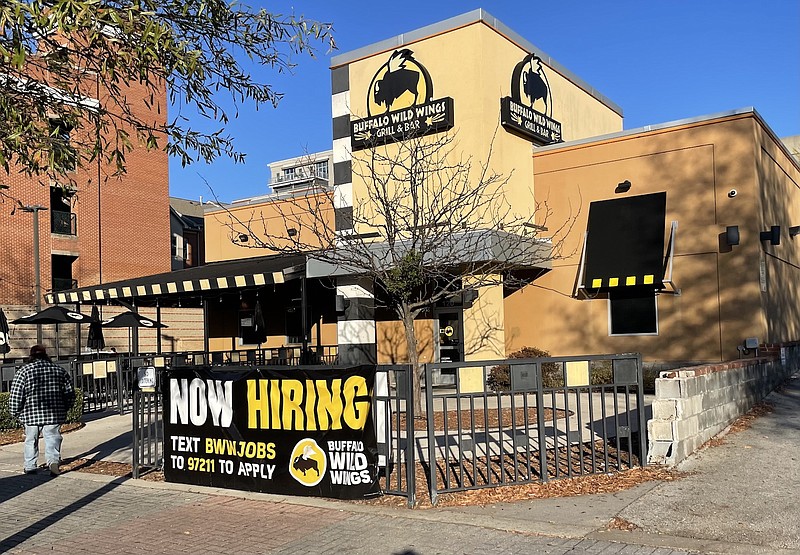Despite a slowdown in the housing industry and growing layoffs in many of the nation's biggest tech firms, Chattanooga ended 2022 with unemployment near its historic lows reached earlier in the year.
The Tennessee Department of Labor and Workforce Development said Thursday that the non-seasonally-adjusted jobless rate in metropolitan Chattanooga declined by a 10th of a percent to 2.9%. The December unemployment rate in Chattanooga at the end of the year was below the non-seasonally adjusted U.S. jobless rate of 3.9% and was just a tenth of a percent above the all-time low reached for unemployment this past spring in Chattanooga at 2.8%.
Chattanooga's jobless rate was also below the statewide average of 3.5% during December.
"There's been a slower rate of growth across all states, but Tennessee remains a very bright spot among all states," Don Bruce, director of the Boyd Center for Business and Economic Research at the University of Tennessee in Knoxville, said in a telephone interview.
Tennessee's career centers Thursday were advertising 357,984 open jobs across the state, or nearly four jobs for each of the 96,624 Tennesseans counted as unemployed but still looking for a job last month.
In Chattanooga, the Chamber of Commerce's job listing site, Chattanoogacalling.com, lists 3,387 open jobs. The state counted a total of 7,698 unemployed persons in the six-county Chattanooga metropolitan area.
The pace of job additions is slowing in Southeast Tennessee, and the counties of Northwest Georgia recorded a drop in jobs and a rise in unemployment last month compared with November, according to the Georgia Department of Labor.
The Dalton area has been hurt by a slowdown in housing and carpet sales since the Federal Reserve Bank began raising interest rates to slow the pace of economic growth. Although up from November, Northwest Georgia still has some of the lowest jobless rates in the region.
Georgia Labor Commissioner Bruce Thompson said Thursday that Dalton recorded an unemployment rate of 3.8% in December, up two-tenths of a percent over the month. A year ago, the rate was 3%.
"Georgia's highly-skilled workforce and business-friendly environment continues to drive positive economic growth across all corners of the state," Thompson said in a report released Thursday. "With the unemployment rate trending lower than the national average, we are well-positioned to help businesses remain competitive and find top-tier talent."
Nationwide as the new year begins, jobless claims from those being laid off from work remain relatively low.
Applications for jobless aid in the U.S. for the week ending Jan. 21 fell by 6,000 last week to 186,000, from 192,000 the previous week, the Labor Department reported Thursday. It's the first time in nine months that number has been below 200,000 in back-to-back weeks.
The four-week moving average of claims, which flattens out some of the week-to-week volatility, declined by 9,250 to 197,500. It's the first time that number has been below 200,000 since May.
Jobless claims generally serve as a proxy for layoffs, which have been relatively low since the pandemic wiped out millions of jobs in the spring of 2020.
AREA JOBLESS IN DECEMBER
Across the Chattanooga region, the non-seasonally adjusted unemployment rate was down last month in 10 area counties, up in six and unchanged in the other two.
— Catoosa (Georgia), 2.4%, unchanged from November.
— Dade (Georgia), 2.4%, down from 2.5% in November.
— Hamilton, 2.8%, down from 3.2% in November.
— Coffee, 3%, down from 3.3% in November.
— Franklin, 3%, down from 3.4% in November.
—Bradley, 3.1%, down from 3.5% in November.
— Sequatchie, 3.5%, down from 3.8% in November.
— Walker (Georgia), 3.2%, up from 2.7% in November.
— Marion, 3.7%, up from 3.6% in November.
— Polk, 3.7%, unchanged from November.
— Whitfield (Georgia), 3.8%, up from 3.5% in November.
— McMinn, 3.8%, down from 4.1% in November.
— Grundy, 3.9%, down from 4.2% in November.
— Van Buren, 3.9%, down from 4.3% in November.
— Murray (Georgia), 4.1%, up from 3.8% in November.
— Meigs, 4.3%, up from 4.2% in November.
— Chattooga (Georgia), 5.1%, up from 3.7% in November.
— Bledsoe, 5.3%, down from 5.4% in November.
Sources: Tennessee Department of Labor and Workforce Development and Georgia Department of Labor
— Compiled by Dave Flesssner
